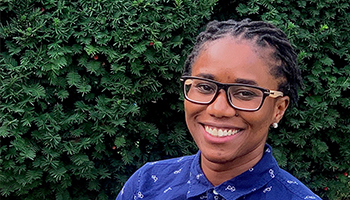HOW CAN WE HELP YOU? Call 1-800-TRY-CHOP
In This Section
Finding Communities’ Voices: Q&A With Chimereodo Okoroji, PhD, New Diversity Fellow

Chimereodo Okoroji, PhD, Diversity Research Fellow. Photo courtesy Mike Chrysosthome
Innovations in science and medicine benefit greatly from myriad perspectives. Children’s Hospital of Philadelphia Research Institute understands diversity is a key driver of the breakthroughs that not only change children’s lives, but encourage investigators of various backgrounds to pursue careers in research. One way the Research Institute demonstrates its commitment to diversity is the Postdoctoral Fellowship for Academic Diversity. Two new diversity fellows recently joined the CHOP research community, bringing the wealth of their unique education, training, and life experiences. In this week’s Q&As, we’ll learn more about these scholars, their areas of expertise and interest, and even a little bit about how they spend their hard-earned downtime.
Our first featured fellow is Chimereodo Okoroji, PhD, whose work is focused on increasing access to behavioral health services and reducing disparities in mental health services.
Tell us about your background and what compelled you to apply for the Postdoctoral Research Fellowship for Academic Diversity?
I obtained my PhD in school psychology from Michigan State University and completed my predoctoral internship in clinical psychology at CHOP in integrated behavioral health care (providing behavioral health services in primary care). I am currently a postdoctoral fellow working with Jennifer Mautone, PhD, associate director of psychosocial research in primary care, and Ariel Williamson, PhD, DBSM, psychologist, on a project examining disparities in integrated behavioral healthcare. I have been interested in disparities in mental healthcare since my undergraduate studies and was excited about the opportunity to continue this work through the Postdoctoral Research Fellowship for Academic Diversity. I applied for this fellowship to enhance my skills in qualitative and mixed methods research, and it provides me with experience in community-based work with a continued emphasis on integrated primary care.
What does diversity in research and science mean to you?
Diversity in research and science speaks to understanding the unique perspectives of the communities we serve and involves intentional efforts to ensure that we are enhancing the lives of our most vulnerable families, which should include their voices rather than our own assumptions of what they need. As researchers, it is important to always consider how our work affects patients and families, and to keep in mind that our work is enriched when it includes a wide range of perspectives from our multidisciplinary colleagues and community stakeholders.
What are some research projects that you’re excited about?
I am working on a project examining the barriers and facilitators to engagement in integrated behavioral health services. I am excited about the qualitative aspect of this study, which will involve interviews with parents, adolescent patients, providers, and other care team members to better understand how we can improve access to mental health services. These uncertain times have demonstrated a need to ensure that underserved populations are able to access and engage with behavioral health supports. I am most excited that this project provides an opportunity to listen to patients and families who are sometimes excluded from research that directly affects them. I am also looking forward to using data from the qualitative study to develop a survey tool to gather information from a larger population.
What inspired you to choose your research focus/specialty? What do you aim to achieve with your research?
As an integrated behavioral health intern at CHOP, I gained experience in providing mental health services in an urban primary care clinic. This experience increased my knowledge of working with an underserved population and issues that may affect engagement in care. Conversations with my mentor inspired me to think through ways of increasing patient and family engagement while continuing my interest in qualitative and mixed methods research. I hope that my work will increase and enhance access to much needed behavioral health services, and lead to improved outcomes for youth and families. I also hope that my work will be used to inform clinical practice and additional research in mental health services disparities.
When you’re not working, do you have a favorite pastime or spot to relax, enjoy a meal, or be active?
I enjoy running and reading for pleasure. I began a reading challenge in my last year of grad school to increase the number of “fun books” I read each year and also participate in a small book club with some grad school friends. These activities help me remember to take time for myself and connect with others, despite the challenges of the pandemic.


